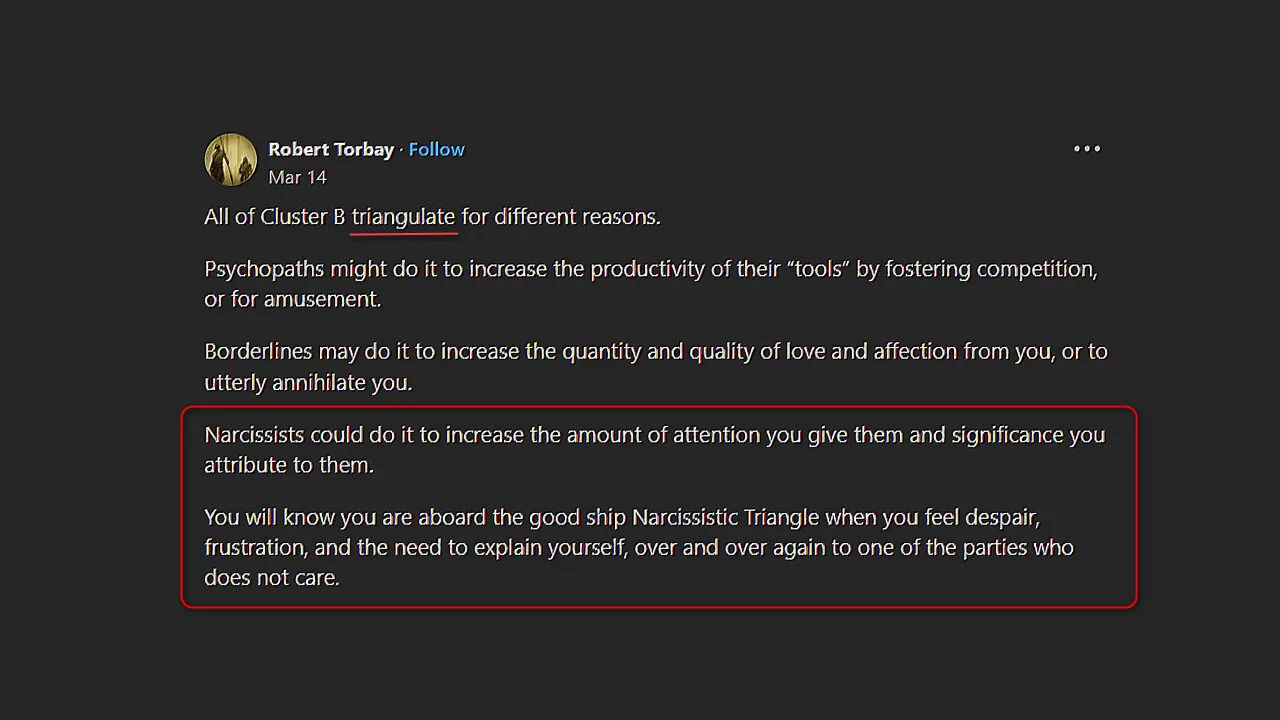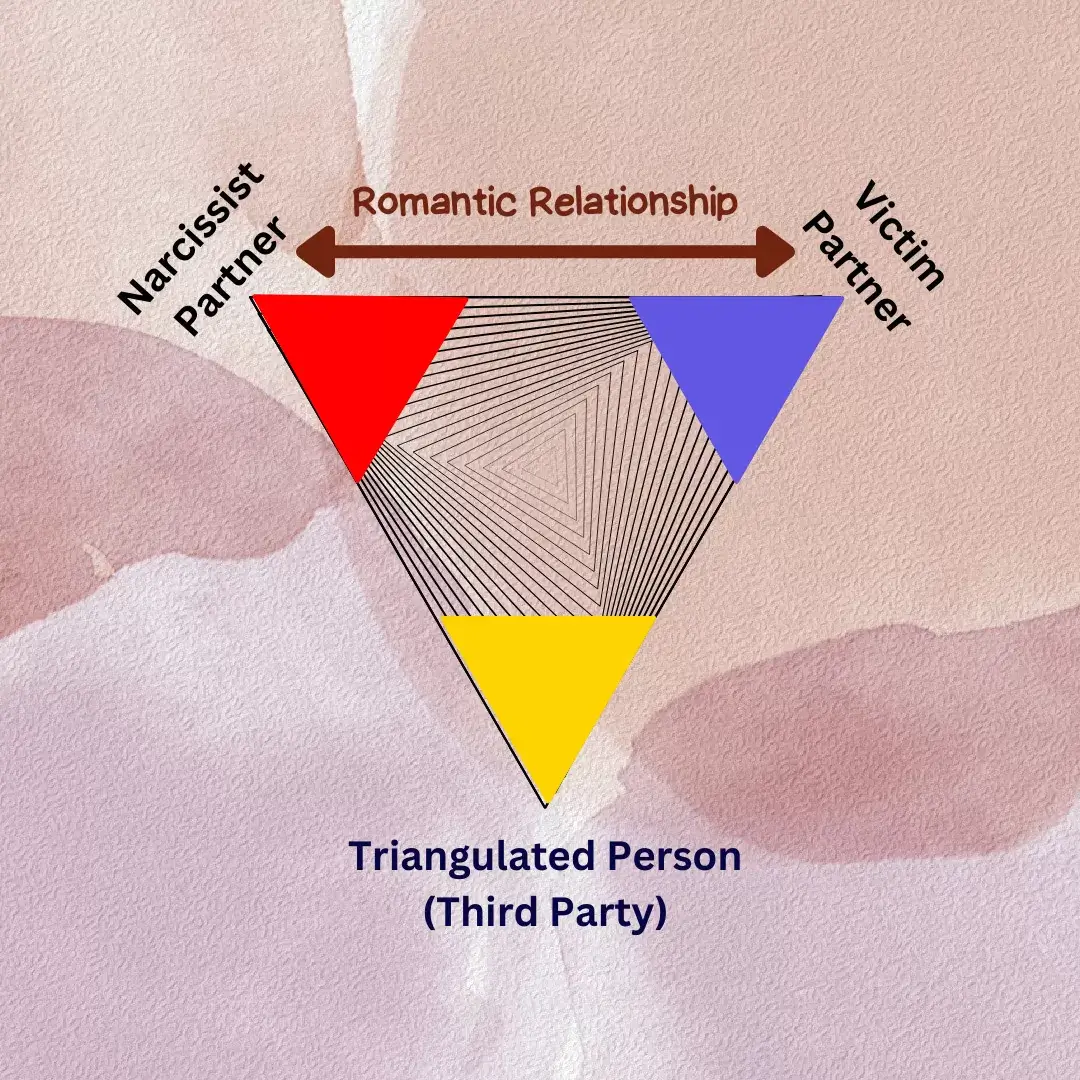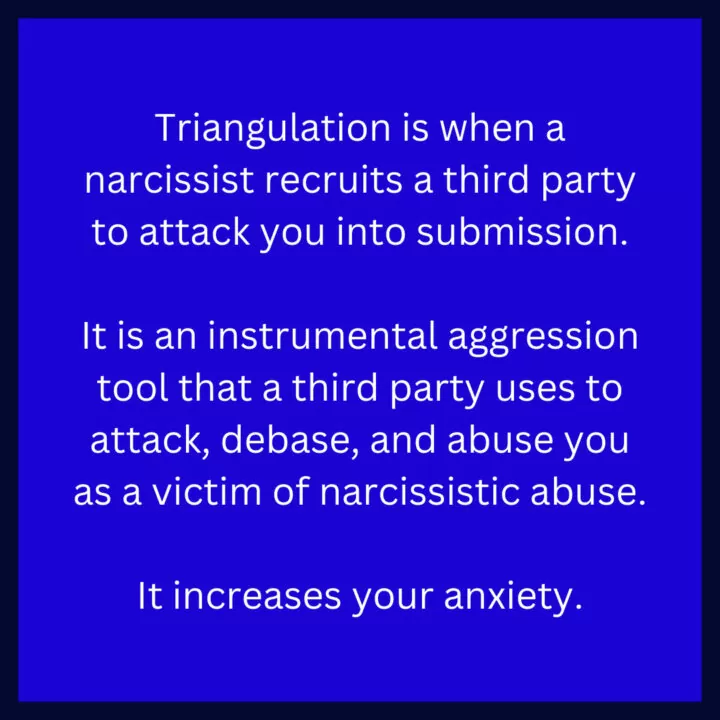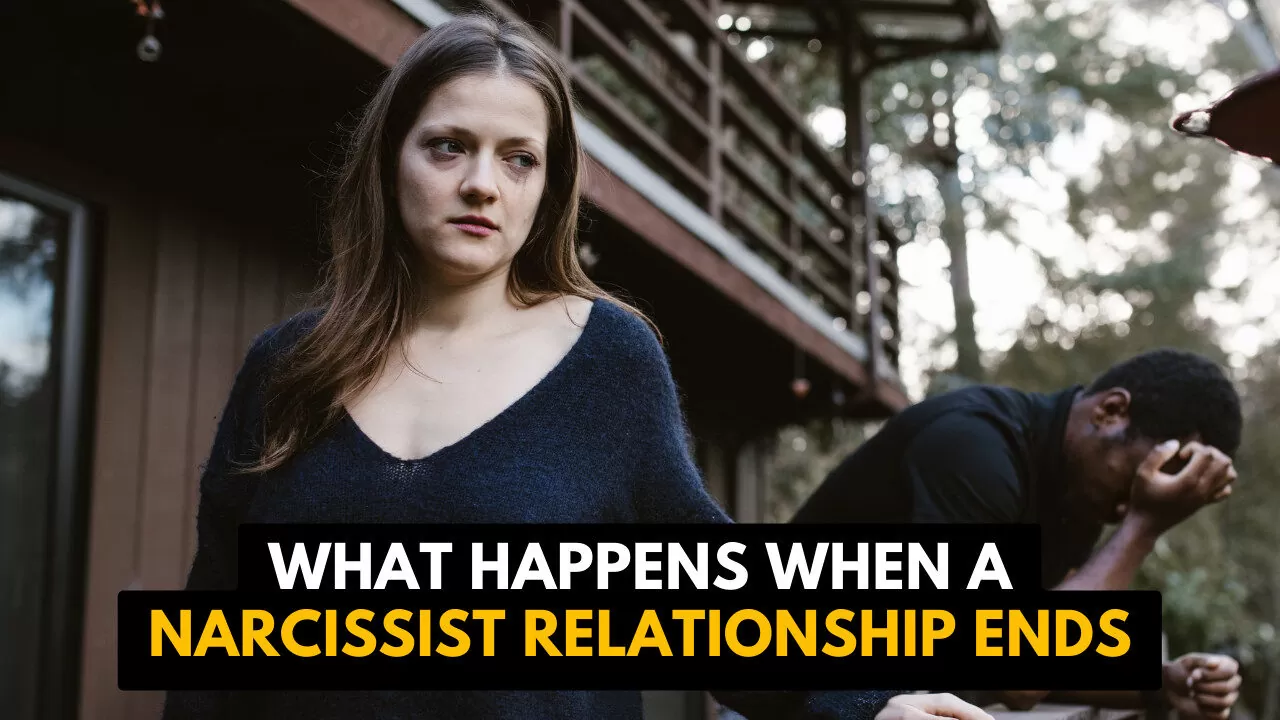— Researched and written by Dr. Sandip Roy.
Are you caught in a twisted love triangle with a narcissist and their ex? This is a manipulative tactic narcissists use to make you jealous and insecure.
Just when you thought that you were the sole focus of their affection, suddenly the narcissist’s ex resurfaces, injecting drama and chaos into your love affair.
Narcissists love relationship dramas. It fuels their ego to see you twisted around their little finger.
That “Drama Triangle” gives the term “triangulation.”
Table of Contents

What Is Narcissistic Triangulation?
Narcissistic Triangulation is essentially a non-consensual trespass on a two-way romantic relationship.
In triangulation, the narcissist introduces a third individual (usually their ex-partner) into their current romantic relationship. The narcissist aims to control and manipulate their victim partner via the triangulated person. It is a non-consenting act of emotional manipulation and abuse.
Noticeable points about narcissist triangulation:
- Triangulation is a defense mechanism that a narcissist uses to protect their ego from stress, anxiety, or conflict, and achieve some immunity from their fear of abandonment.
- Triangulation harms the narcissist’s partner, who finds themselves competing for the narcissist’s attention, questioning their worth, and getting trapped in a toxic cycle that leaves them emotionally drained.
Understanding why narcissists triangulate can help you gain clarity and break free from the toxic cycle.

Why do narcissists triangulate you with their ex?
The reason narcissists triangulate you with their ex is to make you jealous and insecure, which satisfies their constant need for power, control, and validation. It allows narcissists to keep their sense of superiority as they manipulate your emotions to provoke your fears of being left.
Another reason they triangulate you is because, to a narcissist, you are the insignificant other, and they like to rub it in. They bring that outsider into your relationship to make your status even more insignificant, so you get triggered into high emotionality.
- By pitting you against their ex, they establish a hierarchy where they are the puppet master pulling the strings around both their current and ex-partners.
- Narcissistic triangulation creates jealousy, insecurity, and confusion in their targets. Their partners are on edge, constantly striving for their validation and attention.
- This toxic behavior allows narcissists to exert power and control over their victim partners while satisfying their insatiable need for admiration.
- Triangulation is a core element of narcissistic psychological manipulation. A narcissist uses it to send the message that you must “behave well” if you want to have them in your life. Otherwise, they may leave you for that third person.
“All my exes used me. I hope you’re not like them.”
— Classic Narcissistic Controlling Maneuver

10 Examples of Narcissistic Triangulation
- A narcissist may tell you about a flirtatious coworker who is after them, creating an illusion that they hold high desirability. This may cause you to feel insecure and afraid that your partner may leave you.
- The covert narcissist may also use triangulation once they decide to break up with you, but may not say so directly. So, they will find a third person, tell them you are torturing them, and want their help to get out of the relationship.
- The narcissist may take their new acquaintance to a place where their exes or friends of their exes may see them, to show them that they have moved on and are happy.
- They may complain about their ex-partner being selfish and unkind, who used them and dumped them.
- They may complain about their family troubling them, portraying themselves as victims.
- They can bring in a stranger to your home and spend an evening telling them how victimized they feel being with you. And how they coldly refuse to give you what you deserve, even after “caring so much about you to make you happy.”
- Another powerful abuse of the triangulation tactic is gossip-mongering. They may tell you how people gossip about you and plot to deceive you. Interestingly, they also lie behind your back to create a negative image of you. So that when you leave them and try to expose them, no one believes you.
- Once they have created a silent rivalry and conflict between you and the third person, they can take pride in organizing the “cold war.” Meanwhile, the narcissist will behave with “fake empathy” toward each of you individually.
- They will often bring into the relationship a person of the opposite gender and tell you that this third person likes them. And ask you, “What should I do now?”
- Typically, they make sure that you and the third person do not get any chance to sort out your differences. This helps maintain mutual feelings of anger, hurt, and stress, and makes the narcissist feel like a “circus ringmaster.”
Triangulation In Romantic Relationships
Triangulation is fairly common in toxic relationships, especially when one person has a borderline or narcissistic personality.
- The narcissist can pit their romantic partner against an imaginary or real character.
- The narcissist can introduce the third person against you in verbal references or physically.
- They knowingly triangulate to create new conflicts or worsen old conflicts in a romantic relationship.
- Their goal is to make you jealous and insecure so that you compete against that third person and prove that you are better at pleasing the narcissist.
- Triangulation invokes feelings of insecurity, jealousy, and ambiguity in the victim while allowing the narcissist to maintain superiority in the relationship.
Narcissists reach out to another person to convince them to support their viewpoint, which goes against you. They know that if that third party says you’re wrong, they’ll have a stronger position in the relationship.
Narcissist triangulation has malicious intent from the start. It can:
- worsen your relationship with the narcissist,
- create a falsely distorted social image of you,
- destroy your social networks outside your relationship,
- plant insecurity in you of being helplessly alone in the world.
In narcissistic family triangulations, children are often used as scapegoats. Narcissistic parents may pressure their children to choose between the two of them.
Triangulation may be overt, which is more commonly seen in high-conflict families, or covert.
— Alan Carr, The Handbook of Child and Adolescent Clinical Psychology, 2015

It’s like rocking a boat more vigorously when the waters are already rough. Triangulation turns an already unstable relationship more unstable, and you, more insecure and timid.
To stay in control, they may triangulate you with anyone — mutual friends, family members, coworkers, and even complete strangers.
They mostly make sure that you, the actual victim, do not approach and interact freely with the third person while they are not around.
Suspect narcissistic triangulation if your romantic partner is constantly comparing you downwards, attacking your opinions and decisions, and finding faults in you.
Why Do Narcissists Use Triangulation?
Narcissists use triangulation to make their victims feel guilty for “bad” behavior, “repeated” mistakes, and “failing to do anything right.” They aim to instill feelings of insecurity and jealousy in their victim, making them fearful of being abandoned in the relationship.
Narcissists may triangulate you for the following reasons:
- To perplex you.
- To feel superior to you.
- To emotionally shatter you.
- To make you feel unimportant.
- To make themselves seem appealing.
- To put your loyalty reaction to the test.
- It makes you emotionally fragile and reactive.
- It gives them a sense of power and influence over you.
- It helps them unwind as they watch you devolve into a less stable person.
A narcissist’s triangulation boosts their self-esteem and allows them to feel in control.
The triangulated victim is perplexed and mentally exhausted from trying to figure out what else they can do to keep the narcissist pleased.
This gives the narcissist more control over their mentally fatigued and weakened victim.
Narcissistic triangulation can also be a tool of aggression by proxy.
The third person, or persons, may be used to behave like the flying monkeys — people who attack and abuse you as the narcissist’s proxies.

Narcissists may use triangulation to manipulate their partners, family members, friends, and coworkers. They shamelessly use any of their known people against others.
The deeper reason why narcissists triangulate has roots in two of their personality quirks:
- First, a narcissist cannot understand or process empathy. Their lack of empathy does not allow them to care about your feelings or respect your emotions.
- Second, they harbor a cognitive bias called black-and-white thinking. This black-and-white thinking stops the covert narcissist from seeing that people can have both good and bad qualities, strengths and weaknesses, and rights and wrongs.
The black-and-white pattern of thinking in absolutes is also called all-or-nothing bias. Narcissism is associated with black-and-white thinking. For a narcissist, a person, or a circumstance is either all good or all bad.
Now, they want full control over you, and demand a servile level of respect from you. If you were to miss even one occasion of going against their wishes or treating them with disrespect, they would abuse you badly.
Narcissistic triangulation is “bad triangulation” as it can polarize communications, escalate the conflict, and further destabilize the relationship.
They’ll never accept that you, like any other human, made a mistake. They will not forgive you and will want their “pound of flesh” for that one slip-up.
As a result of their insulting behavior, you may decide to end your relationship with them.
When they find this out, they start triangulation to create a sense of possessiveness in you, make you clingy, and maintain control over you.
In fact, triangulation is a part of a narcissist’s “hoovering” process to get you back into the relationship.
The Drama Triangle
Stephen Karpman proposed the Drama Triangle in 1968. Also known as Karpman’s triangle, it describes the roles that people play when a third person enters a relationship.
The three people in The Drama Triangle play three distinct roles below:
1. The Victim
The victim feels powerless and seems unable to make decisions, solve problems, take pleasure in life, or achieve insight.
Strangely, the victim role-player may not be the actual victim, but play the role because they feel victimized.
Narcissists will frequently show themselves as the “victim”—harangued, helpless, hopeless, and taken advantage of.
Then they will introduce triangulation to set higher standards for their victims.
“My last partner used to take me on exotic vacations, but you can’t even buy me a diamond bracelet.”
When asked why they’re bringing in a third person into the relationship, they explain it with their victimhood.
“You made me do it. You never understand my needs. I keep hoping that you would do something to make me happy.”
2. The Persecutor
The persecutor is the self-righteous, controlling, critical, angry, rigid, and entitled one.
When the narcissist in your life is attacking you, they will take on the role of persecutor.
They will blame, shame, demean, and abuse you. They often lose control of themselves and may attack you physically. Some narcissists are truly cruel.
They persecute you because they feel that you have not given them the respect and importance they deserve.
The narcissist can play both the persecutor and the victim, readily switching between them.
3. The Rescuer
The rescuer may have a non-physical position when the narcissist compares the victim with them.
They may be unaware that they are being exploited by the narcissist to one-up their victim.
However, the narcissist may eventually bring home the rescuer and intensify the conflict and drama.
In a codependent relationship, the rescuer does not resolve the issues. They become another person the victim gets dependent on.
They simply allow the relationship to continue to be toxic.
They do not help the victim develop what Carol Dweck called a growth mindset. They do not learn how to fend for themselves.
Moreover, rescuers themselves remain stuck on someone else’s problems instead of tackling their own. This harms them in the long run, of course.
The rescuer can be a family member, a friend, a colleague, a past relationship, or a stranger.
The Drama Triangle endures because the rescuer meets some psychological needs of both the persecutor and the victim.
It is usually the victim who introduces the rescuer.
However, the victim interjecting the third party may not be an actual victim, but only believe that they are a victim.
The person introducing the rescuer intends to use the rescuer to retaliate against the other person.
People who are covert narcissists tend to use triangulation to gain greater control over you, the actual victim.
Psychology of Triangulation In Relationships
Triangulation is the introduction of a third person into a relationship and using them to gain control over the other person. The victimized person involves a third person to strengthen their defense and boost their courage to confront the persecutor.
However, ultimately, triangulation is detrimental to the relationship and destructive to all three parties.
Stressful and dysfunctional families often have triangulation. As a result, the relationships become more stressed and unstable.
Triangulation may lead to either person having paramours, polyamory, or open-ended partnerships.
The apparent usefulness of triangulation is to relieve the constant stress in the relationship. However, the deeper motive of a narcissist is to control the other person and make them look like a perpetrator.
Usually, it is the narcissist (or a borderline person) who brings in a third person to gang up against the victim and maintain control.
Uncommonly, the victim may also initiate triangulation.
Triangulation Experience In Childhood
Childhood triangulation is a process in which a child is drawn into a conflict between two parents, and it has been linked to adolescent psychological maladjustment (McCauley & Sloan, 2021).
Ernest L. Abelin suggested that the earliest sense of triangulation occurs when a toddler sees their father loving their mother.
We can often trace back the first toxic experience of triangulation to a narcissistic parent.
A narcissistic parent may use triangulation to show a child down by comparing them or their achievements to another family member or a neighbor.
Narcissistic parents are typically jealous, possessive, and verbally abusive.
Putting others down makes them feel superior and massages their sense of grandiosity. As a result, they feel relieved of their anxiety by putting their children down.
Children who scored high on empathy show a stronger link between triangulation and adjustment problems via loyalty conflicts and self-esteem (van Dijk & van der Valk, 2022).
Parental triangulation is a particular risk to healthy child adjustment after divorce.
— van Dijk & van der Valk, 2022
Final Words
Narcissistic triangulation is an inseparable part of narcissistic abuse. It’s not just about making them feel good. It’s more about them getting their way while making you feel insecure and insignificant.
Don’t react to a narcissist with revenge triangulation. They may explode with typical narcissistic rage when you triangulate them by comparing them to other successful people.
Keep yourself safe from those who manipulate you into insecure feelings.
√ Also Read: How to respond to a narcissist’s triangulation?
√ Please spread the word if you found this helpful.
• Our Story!


